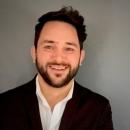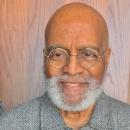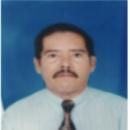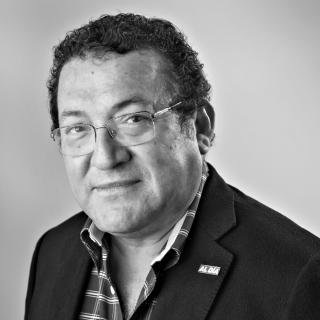
[OP-ED] Elizabeth Guaracao’s Implied Dream: E Pluribus Unum – Latin for "Out of Many, One"(*)|
MORE IN THIS SECTION
(Note of the Editor: This is the edited copy of remarks Reverend Daniel Morrison, Pastor of the Huntingdon Valley Presbyterian Church ask Hernán Guaracao, our Editor and CEO, to give during last Sunday, April 30th, 2023, service, in memory of his wife, Elizabeth Guaracao, deceased on April 10th, 2023, in the Hospital of the University of Pennsylvania, in Philadelphia)
(*) “It is a traditional motto of the United States, appearing on the Great Seal; its inclusion on the seal was approved in an act of the U.S. Congress in 1782”
~Wikipedia.
Speaking from this podium two Sundays ago, Elizabeth Guaracao’s last Pastor, Reverend Daniel Morrison, said, referring to my now departed wife:
“She never shined a light on herself”.
Please allow me to explain how I interpreted the Pastor’s words describing the woman I lived with for 36 years.
In the Anglosaxon tradition, most often it means one thing. In the Latino culture, however, it means almost the opposite.
Not surprisingly, like many other aspects of these 2 cultures that have been placed by the mysterious hand of God one against the other —one juxtaposed with the other— and yet challenged, maybe by the same God, to coexist one next to the other.
Perhaps for us, at this early stage of the 21st Century, to finally figure it out, after 2,000 thousand years of a fractious history during which they have quarreled loudly and, sometimes, bloodily, always one unforgiving against the other.
It is the same quarrel, sometimes cultural clash, some others actual war, that confronted the Roman Empire against those Nordic tribes, the so-called by them —the civilized Romans— “The Barbarians”: Those illiterate tribes that eventually prevailed by brute force and sacked the capital of the Western Civilization, at that time, at the dawn of what we call today our Western civilization and Christian Era, exactly 2023 years ago.
Then another Empire came along to rule the Earth —after Kings and Queens from Madrid, Spain, and hired-gun from Italy, experts in sailing the oceans— came forward and in their search for brand new land to colonize bumped into an unexpected, vast and new continent.
Some cartography monks in Germany decided to call it AMERICA, honoring Americo Vespucci, another Italian, like Christophorus Columbus, but much more insightful on what this new continent would mean for the future of the world.
England, the former remote island Caesars in Rome were reluctant to add to the Empire’s jurisdiction because it was too distant, too cold, and, for them at that time, useless, decided to battle Madrid and their newly-found wealth in America.
Some British pirates, like Sir Francis Drake, became notorious, because they became so helpful to the Kings and Queens in London, that they were made part of the nobility in London, because a new Power, and a Empire —the Great Britain— had arrived and initiated yet another chapter of the confrontation that survives to our days.
The Latino culture to the South, in Spain, and the Anglosaxon culture to the North, in England; same as today is Latin America to the South, and Anglo Saxon United of America to the North, still engaged in an intense but quiet cultural clash that survives to this day.
King’s Felipe “Armada Invencible” was defeated in the Northern Sea, and the battles of the Mediterranean moved to our American Sea, the Caribbean Sea, here in between the two halves of the vast geography of the our new continent.
The cultural misunderstandings, the opposed semantics, and maliciously different vowels in the words of our two languages, only ensures that the mutual misreadings and ensuing confrontation goes on.
Not to “shine a light on yourself” most often means in English not being ASSERTIVE enough, or even a sign of a too modest, or even weak character. Not a individual virtue, but a personal defect, even a crack of our individual character.
In the Latino culture it is exactly the opposite: that “do not exalt yourself” our wise pastor preached to us about 3 or so Sundays ago.
To the South of this continent, in Latin America where Elizabeth and I grew up, our parents decisively disciplined us —even punishing us physically— whenever we took the liberty of “shining too much light upon ourselves...”
Elizabeth was, therefore, extremely, EXTREMELY Humble. (Well, except when dealing with me, her hardheaded husband…:)
GENEROUS, mostly with me, who was next to her all time till the end, and generous as she was with everybody else outside our home, in our office, where we work together, or during our hang outs in restaurants we enjoyed being together for 2-hour meals.
GENTLE, from here, the Huntingdon Valley area, where we lived for 20 plus years, to the entire Philadelphia region, all the way to Colombia and Spain, where we built friendships for the 36 years we lived together.
The expressions of gratitude from everywhere has been pouring for the past 20 days since her departure on April the 10th.
“The greatest among us we hardly notice”
Last Sunday we heard in this church that the major sins that, in our dear pastor’s words are, and I quote, an “abomination to the Lord”, are the following:
“Haughty eyes,” for example, is number 1. Number 2 is a “Lying Tongue.” Etc, Etc.
Pastor Dan Morrison brought up the memory of the 2014 trip to Guatemala I had forgotten about, and that picture he found, of Elizabeth cutting carrots in the kitchen, unveils another piece of evidence.
Yes, this simple person is the person the newspaper of record from our region, the “Philadelphia Inquirer,” found worthy of an extended obituary.
“The greatest among us we hardly notice”, Pastor Dan Morrison has said here before.
“God resist the proud but give grace to the Humble..”, Pastor Morrison has also preached from this pulpit.
(You see, I take careful notes when I am awaken by his good sermons..:)
I personally added a verse from the Scripture that is connected to the same idea and that I liked when I did read it for the first time when I was a very young man.
I printed it in the Memorial Service Notice we sent out to friends and family, and finally placed it over Social Media.
It is the well known Psalm 118, verses 22 and 23:
“The Stone that the builders rejected has become the cornerstone of the house /
“Only by the Grace of God /
And the sight could be marvelous to our eyes…”
“Racial Pride is the most stupid of our sins…”
“Racial Pride is the most stupid of our sins,” Reverend Morrison did say here, too— very loudly for all us to hear.
“Haughty eyes,” when we mistakenly accept that common attitude we all have when we feel superior to the others, those other creatures of God who look and sound different from us.
We, Americans of Latino descent, are naturally inclined to do, once again, exactly the opposite— often attracted precisely to the people that look and sound different from us.
We are that naive, and perhaps that curious…But that is the way we have become over the centuries the only ethnicity on the planet earth that is a sort of résumé of the human race, the abridgment of all its beautiful racial components scattered across 5 continents.
That explains why Elizabeth and I enjoyed coming to the so called “White churches” like this— first the First Presbyterian Church of Olney, in our modest neighborhood in upper North Philadelphia, and this one, the Huntingdon Valley Presbyterian Church, the second and final Church she had in her life in the Philadelphia region. We had agreed to decline the convenience of going to the Hispanic church and hear the gospel in our much more comfortable, native Spanish language.
A more familiar church where we weren’t going to be challenged encountering the stranger, respect and embrace the other that is different, the unknown person that looks different from us— and sometimes even look at us with indifference.
Perhaps that explain the reason why we, Americans of Latino descent, originally born and raised South of the border, look like we do— not “Brown,” as the mistaken nomenclature of our days call us, but, on the contrary, we look the people of all, ALL the Colors, not the rude, simplistic and diminishing “People of Color” label that is attached onto us like a shackle that impedes our free movement. When in reality, if you pause and look closer, the outside appearance of all our Hispanic people —from the dark Sammy Sosa to the cleared-eye and blonde Cameroon Diaz— look like the entire gamut of colors of this Human, Marvelous, Divine Creation, very surely authored by God because of its undeniable and overwhelming beauty.
The cultural misunderstandings, the opposed semantics, and maliciously different vowels in the words of our two languages, only ensures that the mutual misreadings and ensuing confrontation between the Anglosaxon and Latino Cultures goes on after two millenniums.
We Latinos, the “Cosmic Race” Mexican Philosopher José Vasconcelos wrote about at the beginning of the 20 Century, have most of the time embraced the stranger, we have passionately mixed with them, and, in the process, we have made the promise from our Great Seal, E Pluribus Unum (Out of many, just ONE), an amazing reality, only comparable to our equally amazing new continent.
“Cuando Dios hizo el Edén pensó en America”, (“When God made Paradise, He thought of America..”), the classic Spanish song goes on to say.
“Out of many, just ONE” promised from our national symbols we, Americans of Latino descent, have made a reality in us and through us, even before we were allowed to be sworn in before that Great Seal as proud U.S. Citizens.
Perhaps that explains why we resolutely keep coming to America, to the northern half of America, to where our very different neighbors have prospered, but still are painfully segregated and deeply divided along racial lines.
The story behind the Guaracao last name
A bit of our recent but perhaps already forgotten History:
AMERICA was populated up to the 15th Century only by indigenous people who spoke, not our 2, 3 or 4 current languages of European origin, but over 4,000 different languages.
These people were not bilingual, but multilingual— a sign of the very smart people they were: Think of Machu Picchu or the Aztec or Mayan Pyramids, in Mexico, Central and South America.
The names like GUARACAO, the last name I inherited from a poor and illiterate man that was my father— a campesino (a peasant) from the Andes in Colombia, and survivor, with his native blood from indigenous Americas almost intact— those other human beings that were enslaved by the conquest, when not killed by disease or the weapons carried by ambitious European conquerors and colonizers.
Guaracao, from the northern part of today’s Colombia and the Caribbean basin, where similar names, like Guantánamo, in Cuba, or Guararé en Panama, or Guaricó in Venezuela, or Guaynabo in Puerto Rico, exist to this day.
The name of my own tribe was “Guane,” the “Guane Indians”, so modest they never build Pyramids; but they were industrious, organized and well dressed.
Their women were unusually charming and loving, as some Conquistadores noted in letters they left behind, but their children were not recognized. So most likely we were adopted, like my father was, and, in the process, we kept, one generation more, the family name that still carried some shame when I was growing up, when my classmates in elementary school made fun of it, ridiculing its unusual phonetics.
Phonetics that today I make my credulous Anglosaxon friends smile about when I say to them that those phonetics are naturally integrated in the English language, the one that I am still learning, as you can see, coexisting in my brain next to my native Spanish, equally made also of millions of words, beautiful sounds, vast semantics, and multiple and infinite meanings.
Guaracao, I say to my over-trustful friends in North America, is like that expression you say in English when you go to Lancaster, Pennsylvania, and see a big, HUGE cow:
Guaracao, I say to my over-trustful friends in North America, is like that expression you say in English when you go to Lancaster, Pennsylvania, and see a big, HUGE cow:
You say naturally, of course, “What-a-Cow!”. When you put the letter “G” in front, you produced, very naturally, the exact, native pronunciation of my last name in Spanish.
A family name mocked by my Spanish ancestors who nevertheless gave me also my Mother’s maiden name, “Calderón” —pure bloodline from Southern Spain— and now mocked by myself in the North, just to break the ice and make your smile possible, dear reader.
So I am Guane, a Guane Indian, mixed with European blood:
Guaracao was actually a common last name in the original America to the South, and two tiny small villages, one in Colombia and one in Cuba, preserved today the indigenous word in their names spelled exactly the same: “Guane”.
Besides the names, or the beautiful sounds they represent, only fossils survive, and pictures of paintings on the stones found in caves, like those in Altamira, Spain, discovered and collected by the few Historians that have spent the time on the forgotten subject of the vanquished race, who were originally the natural owners of the land in the new continent.
Although modest in their demeanor they were very, very smart, at least smart enough to understand clearly you could’t own the land, as the mad Europens that raped and killed to possess it, believed.
The wise Indians rather believe, much more deeply, that the land owns us instead, as you inevitable return to it at the end of your life, when your haughty eyes are reduced eventually to humble ashes.
A bit of additional information forgotten from our recent history:
Spain took most of the Continent beginning on 1492, when Christophorus Columbus made it to the island of Guananí (another Native American name), and other conquistadores like Hernán Cortés, my ancestor by virtue of my first name (not Herman, but Hernán), went on to today’s Mexico, and burned his ships so his men, and descendant of his men and women, had no other choice but to make it all the way up to today’s Washington State, on the North, and all the way down to the whole South American part of the continent, from Colombia all the way to Argentina.
Until the Pope in the 16th Century decided to stop the voracious Spanish Empire conquest of America, in route to what is today’s Brazil, giving instead a piece of land to the smaller European country of Portugal. In the process, he made our assistant Pastor, Reverend Bruno Sousa, originally from Brazil, to preach the Gospel, not in Spanish, or English, but yet in another beautiful Romance language: Portuguese.
The French were given Haiti, one Guyana in South America, a piece of the South named Louisiana, and not much more, while Spain kept for itself most of the continent, including the big Texas and huge California, becoming effectively the new world power, the next Empire in the Western Civilization, for the next 400 years.

The U.S. flag is now a symbol our young adults of Latino and/or Multicultural backgrounds, born to immigrants parents, and U.S. Citizens by birth, have adopted as their own. Depositphotos
“The original 13 Colonies”
Remember that here in the North, we started over only 100 years later, in 1607, with the first of very shaky 13 small settlements we called later on “the original 13 Colonies”, the foundations of our first 13 States, gradually laid out over the Eastern Seaboard, from Massachusetts to Georgia.
Even Florida had been taken first by Spain, while Louisiana, named after French King Louis the 14th or 15th, was French property until U.S. President Thomas Jeffersson gladly bought for under $50 million U.S. dollars from the absolute King in Paris.
Spain, England, and France, carefully divided the vast continent as the spoils of war they were until President James Monroe said, “No más”. “Not anymore”, and he proclaimed “The Monroe Doctrine”:
“America only for Americans!”
Which meant that no more European monarchies colonizing this rich and vast land for over 300 years were allowed to do so anymore. Even the Mexicans shot to death Emperor Maximiliano, from France, when he brought his French soldiers to declare himself the European Monarch of México in the late 19th Century.
Monroe was only our 5th President, el Presidente Número 5, presiding over a young nation that eventually went from Shining Sea to Shining Sea over the next 200 years, after Independence was declared in 1776, here in Philadelphia.
Only 1 century and a half ago, when we prevailed in the Mexican-American War of 1848, and we claimed from Mexico —not purchased like we did with Louisiana— we doubled, in a single charge of our cavalry and artillery, the size of our nation, going from 13 States to 50, eventually making Alaska, and Hawaii, the tiny island in the Pacific Ocean, our new States, while we hesitated over what to do with Puerto Rico or the Philippines.
We dismembered Mexico, taking two thirds of their territory.
From Tejas to Montana, to California (all beautiful Spanish names), all the way to today’s Washington State.
Then we went on and finished off the previous Spanish Empire by sinking their ships made of wood, with our destroyers made of steel, taking from the Spaniards their final colonial possessions in the Americas, Cuba and Puerto Rico, in 1899. The battle only lasted a couple of days or weeks.
62 million of Americans of Latino descent
In the nation of today, the year of our Lord 2023, 62 million of Americans of Latino descent live here, as our next door neighbors, according to the US Census count from the year 2020.
Some were forcefully added, initially as US Citizens in the Southwestern States, and that is why they say that they didn’t “cross the border, but the border crossed them.”
Over the following 170 years since the end of the Mexican-American War in 1848, millions more have been pushed to the North, under the economic and political pressures stemming from failed government and economies left in ruins in the South by the Spanish Empire’s devastation and plunder of the land, in addition to our bloody wars of Independence from Spain colonial powers.
Today, the United States continues to be blessed by immigrant fresh blood, as if we were still growing as fast as it did in the 19th and 20th century, when we receive via Ellis Island those poor and undereducated Europeans that came also by the millions, in no different fashion as those that today still form long lines at our Southern border, facing a blind and inhumane wall we haven’t able to finish in 100 years of labor.
That quiet and unassuming woman named Elizabeth…
I told you this could become a political speech, not a sermon anymore, Reverend Morrison.
So let me go back to Elizabeth:
She and I were just two more undocumented Latino immigrants in 1988, and, like those who crossed the border last night as undocumented sojourners, we brought along a little child in our arms.
She was the one-and-a-half year old Gabriela, the little girl from North Philadelphia who attended exactly 30 years ago the Huntingdon Valley Elementary School, right here in this building next to the Church.
As you probably read in the Inquirer’s Obituary, it was Elizabeth —that quiet and unassuming woman who sat all the way on the back bench of this church— the person with the determination I didn’t have so that we could give little Gabriela, and later Anna, our younger daughter, born to us here in Jeanes Hospital, a much better life than the one we had in Colombia, in South America.
The Divine Providence blessed her, and me by pure good luck, as she prayed all along, every single day of her life— a life that ended quietly and peacefully one day of this beautiful month of April, 2023.
68 well-lived Aprils in her case, with a final balance that my household is now undeservedly inheriting as the best part of our family's wealth, simple yet rich memories I'm beginning to share with you.
After 36 years of living together in the United States —more than half of our lives— Elizabeth stopped her very audible prayers on April 4th, when she finally, and reluctantly, accepted to be taken by me to the Emergency Room of the Hospital of the University of Pennsylvania.
On April 10th, before Sunrise, and still Easter Day, she quietly stopped breathing after doctors said it was useless to preserve her heart beating artificially. “She died twice —a young doctor told me, describing how her heart has stopped two consecutive times in the Emergency Room— not knowing he was giving me memorable lines to preserve and share with you today.
“She died twice,” but “she indeed lived twice,” once in the South, one in the North of our beautiful American continent.
Now that perhaps she is living yet a third life —this one in Eternity— she has, perhaps, begun a new prayer —not in Spanish, not in English— but in the universal language of God we all can understand.
An altogether new prayer that although silent, I can still hear —and also see its surprising and marvelous answers— as more and unstoppable evidence continues to materialize and unfold marvelously right in front of my eyes.
For her immediate family —Gabriela, Anna and me— and also for her community: You and I, and the rest of all, ALL our neighbors.
The local ones here in Huntingdon Valley, and all across Philadelphia, and also all across her adopted country— this great country of ours, the United States of America.
This country, yours and mine, she always told me —or, better, commanded me— she had decided to remain forever in, even after death. “I’m not going back to Colombia”, she would firmly say, specially when she got tense every time I brought up the subject of our inevitable release from our physical bodies.
We just obeyed her command, as we always did, to never go back —except only for short vacations— and she is now resting in the Laurel Hill Cemetery, overlooking the beautiful Schuylkill River in Philadelphia, Pennsylvania.
I am absolutely confident today that her prayers for my family, for AL DÍA, for the City of Philadelphia, for the State of Pennsylvania, and this, our adopted Country, the United States of America that gave us refuge, will continue to be answered.
Particularly, as we, the living, do our part to deserve again the new miracles, those many more yet to happen.
*Hernán Guaracao is the Founder, Editor-in-Chief & CEO of AL DÍA News







LEAVE A COMMENT:
Join the discussion! Leave a comment.